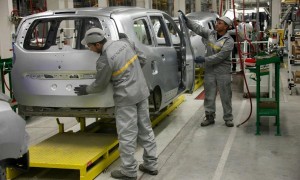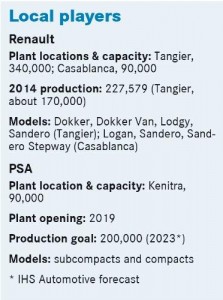Automotive News Europe E-Magazine
Andrea Fiorello
Morocco is accelerating measures to expand its supply base as it seeks to more than double vehicle production capacity to 1 million units in the next 10 years. “Today about 40 percent of the parts for vehicles built in Morocco come from 200 locally based suppliers. We know it’s not enough so our ambition is to increase the supply chain integration,” Khalid Qalam, senior adviser with Invest in Morocco, told Automotive News Europe.
Qalam said the goal is to boost locally sourced parts to 60 percent in the short term and to 80 percent by 2020.
The Moroccan government is counting on the country’s proximity to Europe and a business-friendly environment to attract more investment from carmakers and suppliers as it seeks to double the value of automotive exports to $10 billion in five years. To reach its goals, Qalam said that Morocco needs to lure global suppliers “like Magneti Marelli, Valeo, Bosch and Continental.”
They would join companies such as Delphi, which employs about 9,000 people at three factories in Morocco that make items such as advanced wiring systems and high-precision connection systems, and Denso, which manufactures air-conditioning systems and instrument panels. Other global suppliers with operations in Morocco include glassmaker Saint-Gobain, seat maker Lear, wiring harness maker Leoni, interiors and exhaust system provider Faurecia and thermal energy management and electronics specialist Visteon.
Renault’s head of business development in Morocco, Cedric Tournebize, would like to see companies that make complex and capital-intensive components open plants in the country.
“We really need more suppliers in Morocco to improve our competitiveness and this goes through all tiers,” he said. “PSA has confirmed its plant and other manufacturers said they want to source parts from Morocco, therefore we’re reaching a volume that will allow bigger suppliers to open profitable local factories.”
The new and existing suppliers have a growing number of automakers to serve. Renault has two factories in Morocco while PSA/Peugeot-Citroen will begin building cars near the coastal city of Kenitra in 2019. Media reports have said that Volkswagen Group has been in talks with the government to open a plant in Tangier. Ford is using Morocco as a base to purchase components made in low-cost North African countries.









